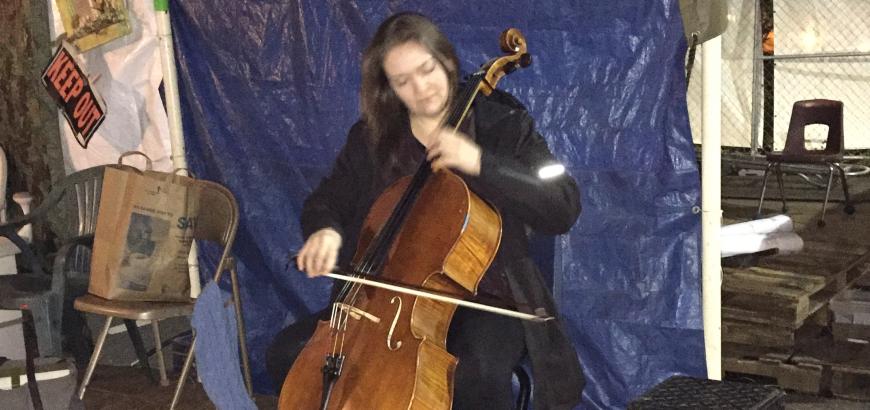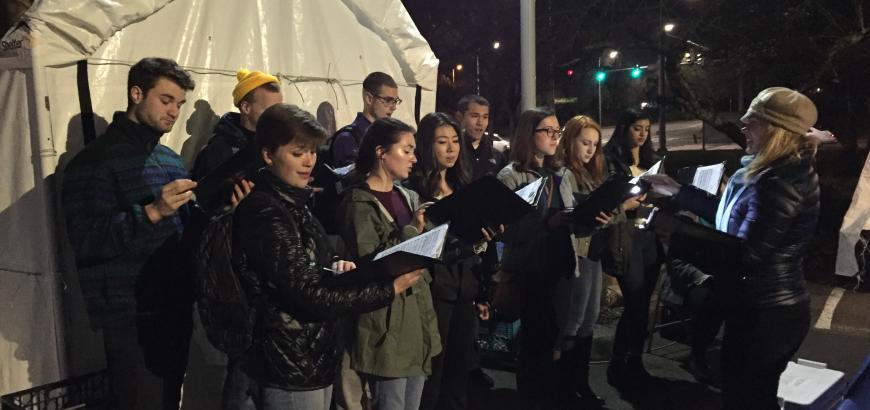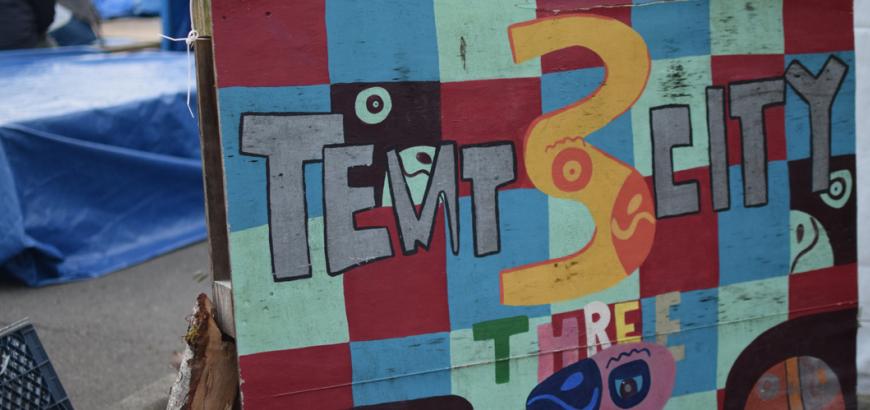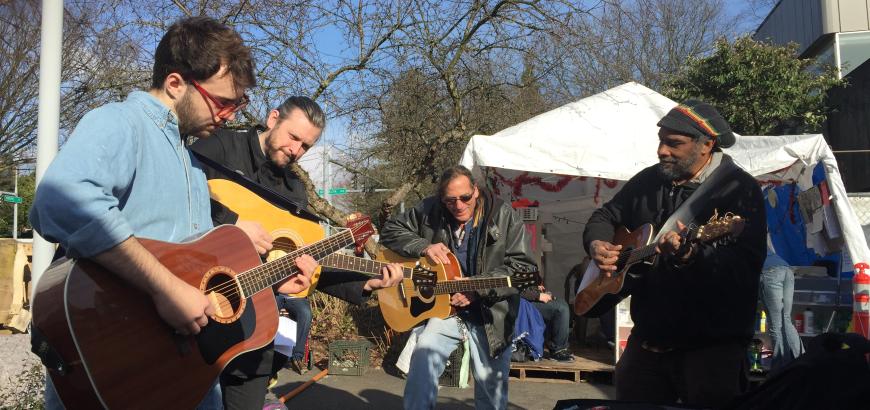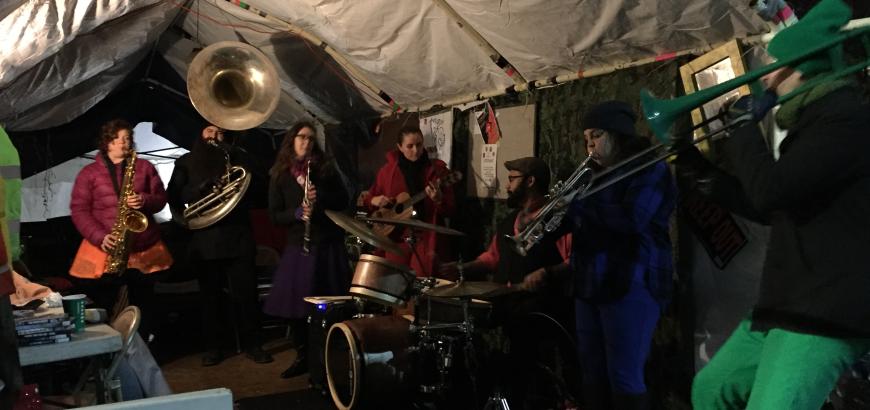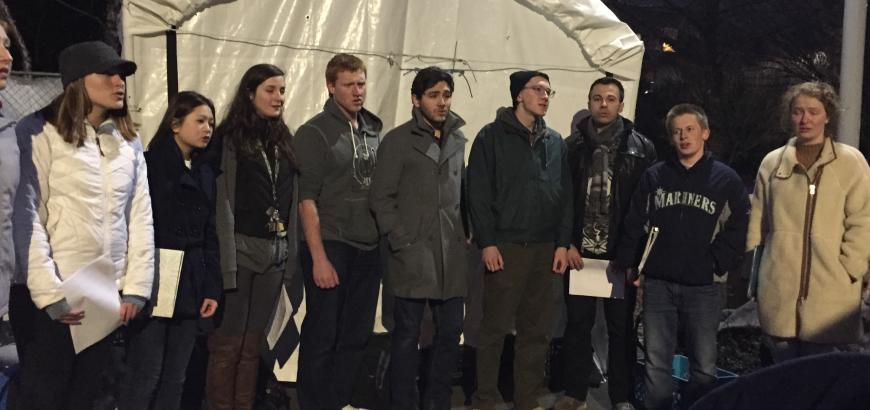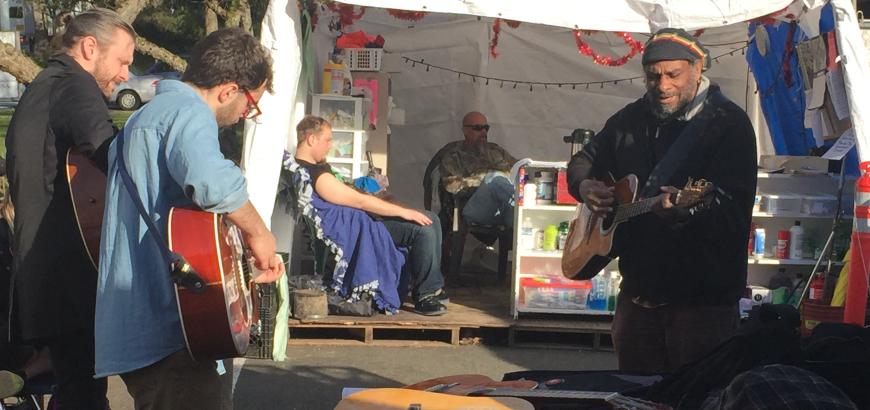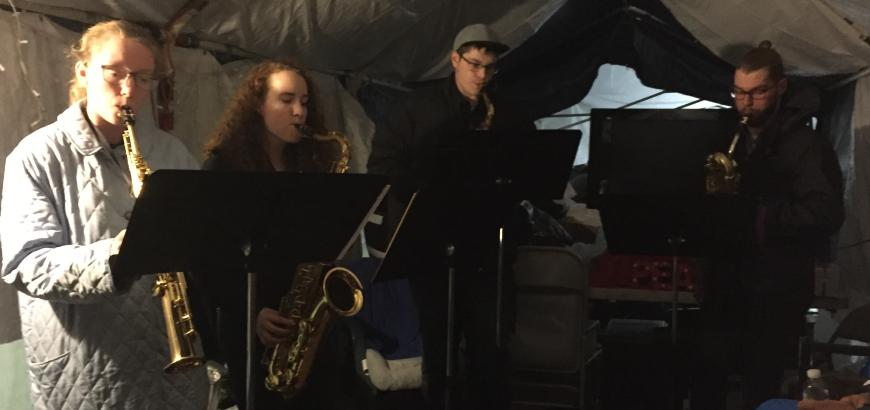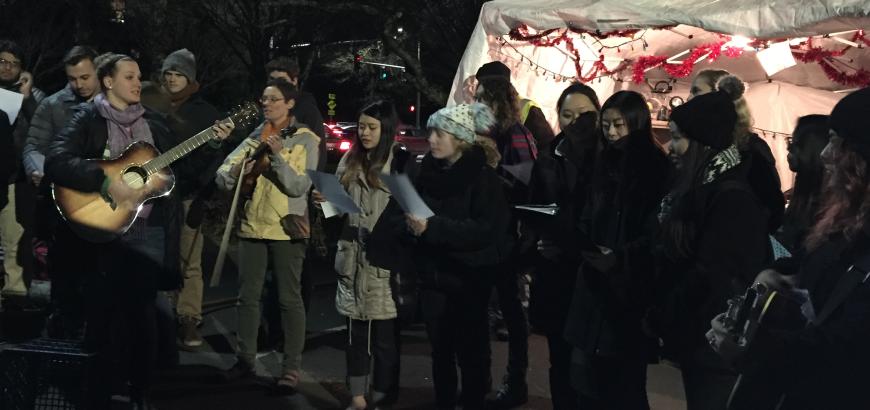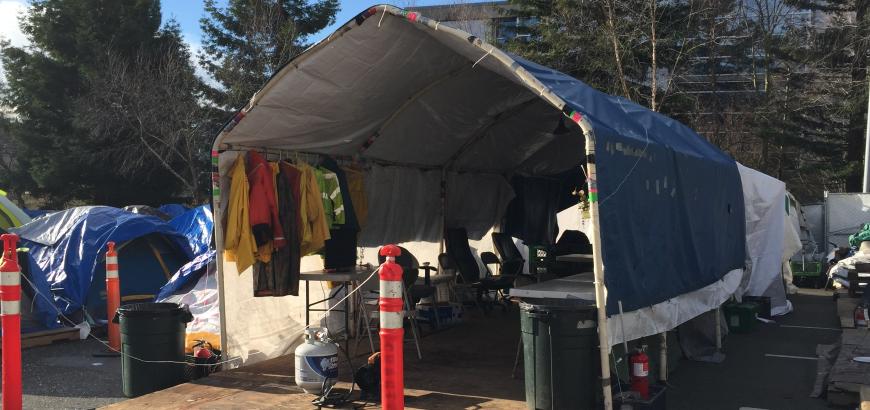Graduate choral conducting student Jennifer Rodgers discovers what is possible when a university that provides space for a homeless encampment also has a world-class music department.
Throughout Winter Quarter 2017 a most interesting mix of sounds could be heard coming from the W-35 parking lot of the University of Washington and the crowded, colorful, fenced-in community of Tent City 3. On Mondays, the normal cacophony of the camp (in residence at the UW’s southern edge from late November through mid-March of 2017) included an additional layer of musical sounds ranging from a jazzy brass band, to a solo cellist playing Bach, to a tight-harmony a cappella group. And on Friday afternoons, groups of students and faculty could be heard wailing out what they remembered of classic rock tunes along with any TC3 residents who wished to join.
Jennifer Rodgers, a doctoral student in choral conducting at the School of Music, organized these music initiatives after learning that Tent City would be on campus during the winter quarter. In doing so, she created the first regular music series to be offered at Tent City 3 – one of five portable, self-managed communities that extend from the democratic, grassroots organizations of the Seattle Housing and Resource Effort (SHARE) and the Women’s Housing Equality and Enhancement League (WHEEL).
“I was looking for a way to be involved with the huge issue of homelessness in Seattle and I have access to a top-notch body of musicians,” Rodgers says. “It seemed like a natural pairing.” Monday night performances by UW students, faculty, and alumni included the Give Back Brass (a socially-invested group of experienced musicians co-founded by a UW choral conducting alumnus), Sæunn Thorsteindóttir (a world-class cellist and artist-in-residence at UW), a chamber group of the University Chorale (UW’s advanced, auditioned undergraduate chorus) led by faculty conductor Giselle Wyers, two a cappella groups from the campus (Tight Chords and Unleashed), the University Men’s Glee and Women’s Chorus, a saxophone quartet, and the UW percussion ensemble.
In addition to the Monday performances, Rodgers and colleagues from the School of Music would head down to Tent City on Fridays to see if anyone in the community felt like singing. Rather than a traditional song circle or classroom setting, the Friday hour evolved into a jam session of classic rock karaoke with Tent City residents and UW Music students.
For the university musicians, the Tent City sessions provided a rare opportunity to share music in an environment outside of the concert hall and the classroom, a decidedly non-traditional setting in which the act of giving the music was as appreciated as the music itself.
For Rodgers, the experience of planning and executing the endeavor proved fruitful in entirely unexpected ways. Ideas and goals formulated in theoretical mode have a way of morphing into something unanticipated in the here and now, as she discovered on her very first visit to the camp, where the tools and skills she employs in traditional classroom settings proved inapplicable.
“I came to the first participatory music session on January 6th with song-sheets, a lesson-plan, and three colleagues, thinking that we were ready to adapt to almost any number of participants,” Rodgers writes in a reflection she compiled at the conclusion of the project. “We spent the hour singing amongst ourselves and gradually making contact with a couple of residents, both of whom were interested in the event (in very different ways), but clearly not going to participate in the kind of sing-a-long or facilitated conversation that we had envisioned. I found that I was disappointed, feeling self-conscious and even embarrassed in front of my colleagues that I had asked to come with me." Worse, as the next week’s session was even more awkward (in my eyes) and now with one of my primary faculty mentors with me, I found I was confused and even a little angry. In my organized way, I felt that I had done “all the right things” in setting up this experience. I had contacted the main office, then, at their suggestion, written a proposal for the residents, and visited an internal meeting of the camp in December to present it. The residents were enthusiastic about both the concert series and the participatory music time and, over email communications, chose the times and frequency for both. This, to me, was an agreement and we were all on the same page. I know now that being on the same page doesn’t mean anything when you are living entirely different life stories.”
Over the course of the quarter, Rodgers and the musicians adapted to the unique needs of this unique setting and adjusted their expectations accordingly.
“The residents were enthusiastic and they were appreciative of the offer. They were also cold, working long shifts at the camp (which had shrunk in residency to just 40 out of a possible 100), had unpredictable schedules, little sleep, and a host of medical, employment, and survival concerns. From the first session at the UW camp and throughout the quarter, I was greeted warmly. I was “the Music Lady” and had several residents express thanks for what we brought to them – more often than not from those who were never visible participants. They weren’t embarrassed by the turn-out, and they didn’t respond to the performing groups or to our participation sessions in any traditional way. They felt no obligation to congregate, clap or participate, but they were listening, and they were usually glad that we were there.”
At the close of the project, Rodgers reflected further on the value of the experiment.
“It all was a deeper lesson in meeting people where they are and realizing that is sometimes different than where they say they are, or where they need to be. Was the experience of value to them? Was it a ‘success?’ I think that the answers are ‘Yes’ and ‘It doesn’t matter,’ respectively. I don’t know what the unintended consequences or ripple-effect of the project will be, but I know there are already ripples for me.
"In addition to offering these musical events for Tent City 3, I also hoped to learn more about the homeless in my new city of Seattle – the people, their lives and environment, the nature of the issues they face – and I certainly have. Recently, The Seattle Times reported on the result of a 2016 needs assessment of Seattle’s homeless. It contains dozens of tables that describe the demographics of the homeless population – age, mental health, education level, reason for onset of homelessness, etc.
"My experience with the people of Tent City 3 has already made that information, though important, irrelevant to me. I cannot communicate with, make music with, or hope to understand a culture in such broad terms. I can only connect with people and we can only impact each other as individuals. I trust that my experience with Ivan, Darren, Christian, Jeffrey, José, John, Jonathan, Abby, and the other residents of TC3 will remind me of that knowledge and guide me in more ways that I don’t yet know.”
